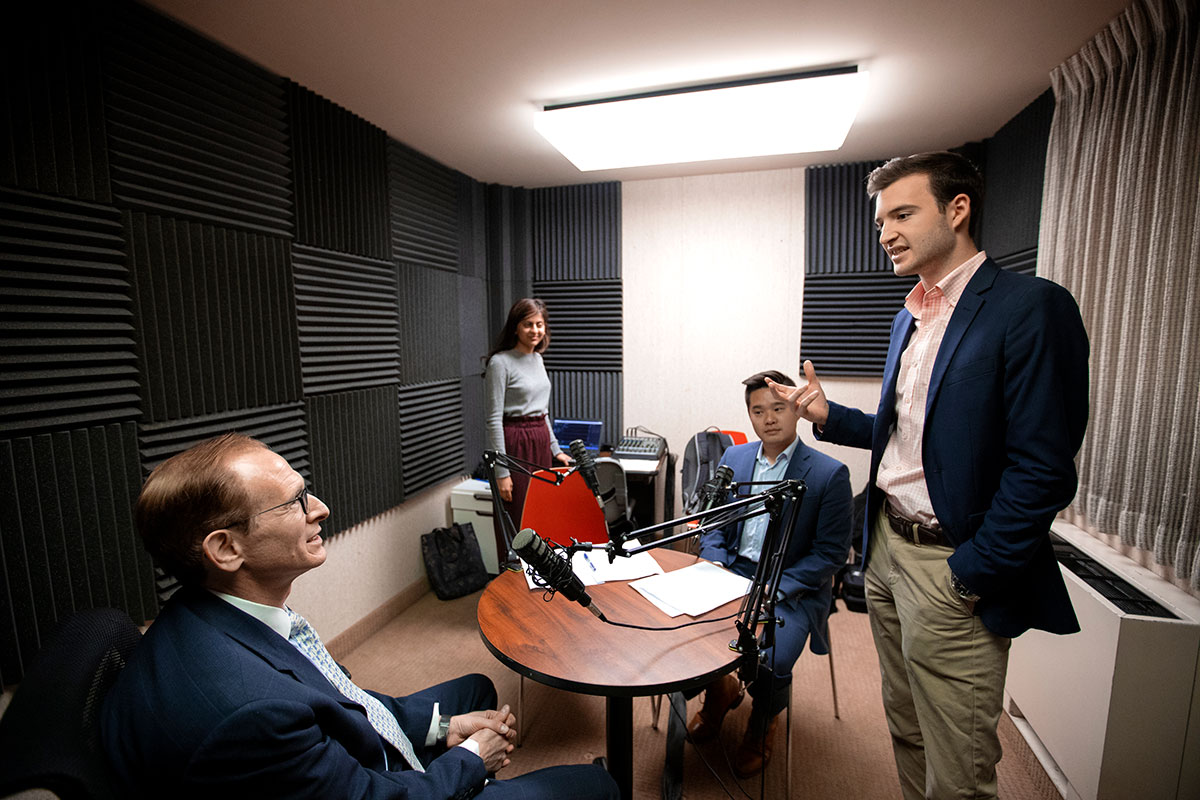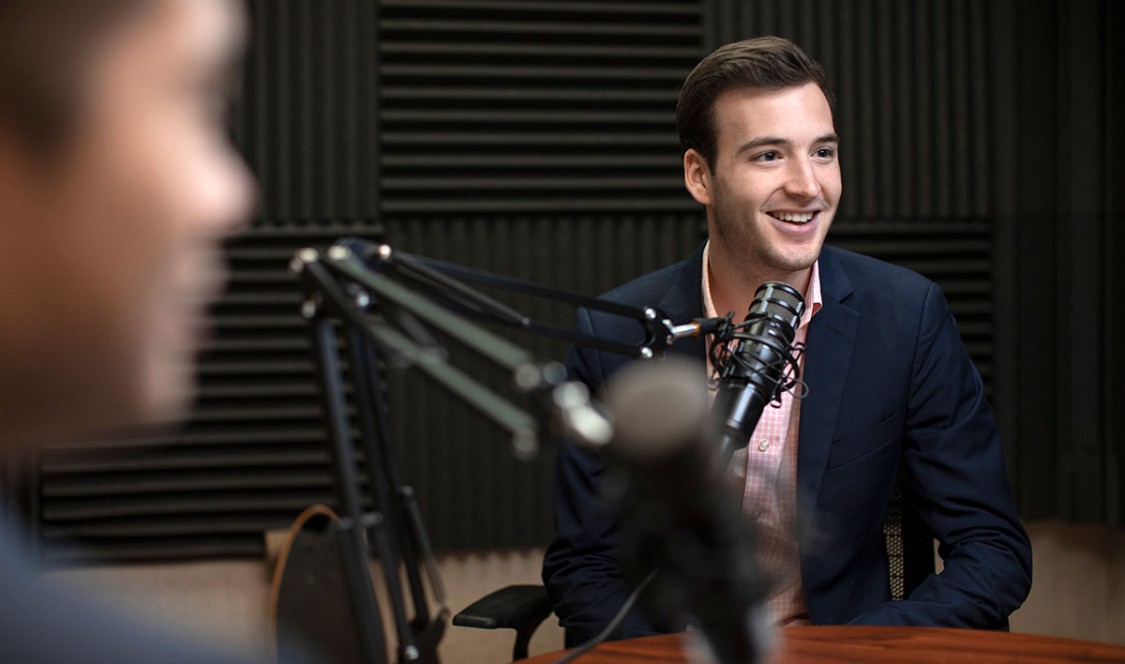Upstairs at the Marian Miner Cook Athenaeum, in a converted office with black soundproofing material cascading down the walls and a hunk of electronics on a table, Nandeeni Patel ’21 and Zach Wong ’19, quickly review their notes. All set.
Today’s guest, Benn Steil, senior fellow and director of international economics at the Council of Foreign Relations, arrives. It’s 4:28 p.m. The trio exchanges handshakes and hellos before they settle at the round table and adjust their mics. How’s the sound? Good.
And they’re live.
“Where was a place that you had to pivot in your life?” asks Patel, a philosophy, politics, and economics major. From there, they wind through questions about his writing process, The Marshall Plan, Steil’s goals at CFR—the discussion, as Patel intended, taking its own organic shape.
5 p.m. The students thank Steil. The mics go cold. That’s a wrap on another episode of Free Food for Thought.
HEAR IT LIVE
Free Food for Thought will host a live Family Weekend podcast this Saturday (Feb. 16) at 1:45 p.m. in Pickford Auditorium. The special guest will be Kim Sajet P'20, director of the National Portrait Gallery in Washington D.C.
Now in its third year, FF4T—the name is a nod to two college student favorites, free food and interesting thoughts—is a podcast with a clear mission: to amplify the impressive voices of the leaders, academics, artists, and alums who speak at the Ath each semester. It is also an organic example of how to bring valued CMC tenets—free speech, viewpoint diversity, and effective dialogue—to a creative, popular format that students can own.
“We are not seeking scoops and we are not asking gotcha questions,” said Richard “Skip” Wiltshire-Gordon ’19, the podcast’s director. “We are a counterweight to the 24/7 news cycle, Twitter feeds, and social media likes. We seek the productive dialogue that is talked about a lot, but that we are actually having.”
Listeners tune in via iTunes, Stitcher, or SoundCloud. They don’t, however, hear a version of the presentation Ath speakers give in the dining room downstairs. The podcast’s mandate is to travel wherever a conversation wants to go. Explore previous research. Tangential ideas. Surprising connections. But what makes FF4T worthy of any playlist is its focus on the personal: highly-regarded people opening up about their road to success, potholes and wrong turns included.
“We think of it as gathering hundreds of people around the head table at the Ath,” said Wiltshire-Gordon, a government and history dual major.

Student driven
In the fall of 2015, Shivani Pandya’s father casually mentioned his surprise that more colleges didn’t have podcasts. Pandya ’18 didn’t know much about them, but instantly thought of Ath speakers. They already come to campus to talk with students, so why not give them another way to have conversations? Priya Junnar, the Ath’s director, enthusiastically agreed. Using software downloaded from the Internet and handheld mics they stored in Ath manager Dave Edwards’ office, Pandya and a co-host launched FF4T with an interview of comedian Kamau Bell in January 2016.
Over the next few months, the growing team conducted several more interviews and built a website where people could access them. They recruited and trained more students, including Wiltshire-Gordon. As it became clear FF4T had legs, Junnar suggested the podcast take up residence in a rarely used office across from hers. With additional funding from the Ath, the team bought more sophisticated equipment and set up their new digs—instructions for installing soundproofing supplied by Google.
This academic year, the podcast’s team is 18 strong. About nine students conduct interviews, with others handling scheduling, technology, marketing, and other logistics. When hiring potential student hosts, Wiltshire-Gordon said they seek diversity, not in the sense of balancing liberals and conservatives, but with the aim of building a staff with a broad range of opinions, interests, and experience.
“The breadth and diversity of the team shows up in the conversations,” he said. “No two are alike.”
Launching any new venture comes with challenges, and FF4T has not been without stumbles. An alumni series was started and scrapped (Wiltshire-Gordon said it may start again in spring). The time between an interview being conducted and going live could drag on for weeks because of busy schedules (These days, episodes have posted regularly on Tuesdays and Fridays at noon.)
Guests, however, have been singing the podcast’s praises from the start. Junnar recalls early guest Randall Kennedy, Michael R. Klein Professor of Law at Harvard, saying the students had the “best questions anyone ever asked him.” Chef, restaurateur, and Fresh Off the Boat author Eddie Huang, at first reluctant to participate, commented afterward that he “would give all of them a job.” After Wiltshire-Gordon and Pandya interviewed director and producer Lynn Novick, she sent a note describing their conversation as “the most thoughtful and interesting” she’d had all year.
“I was enormously impressed with your preparation, seriousness of purpose, and professionalism,” wrote Novick, who most recently directed The Vietnam War documentary. “You asked many questions I had never been asked, and as a result we were able to explore some profound issues and themes.”
Signature style
During that Feb. 2018 conversation, Novick told listeners she’d entered college to become a doctor. Columnist Jonah Goldberg said his path to writing commentary began when George Will called him an “idiot.” Steil was in graduate school at Oxford when he decided to pursue his passion for academics rather than pursue a more practical path as his parents urged him. Those tidbits came in response to a question about inflection points in their lives or careers—the first of two questions that bookend each episode. The podcast’s closing inquiry is tailored for its primary audience of students: what does success mean to you, and what advice would you give college students defining it for themselves?
Those signature questions—along with always having two hosts—anchor the disparate episodes into a coherent series. And they open doors to a guest’s personal narrative, revealing aspects from their lives and careers that go unmentioned in other settings.
“When we get a thought leader to break away from prepared remarks and talk about pivots and meaning in their lives, that is something people can’t get anywhere else,” said Wiltshire-Gordon.
The approach, said Patel, also helps “humanize” the speakers. “We hear about their failures and their setbacks, as well as their work,” she said. “For students, that has a real impact.”
Case in point: Patel is interested in international relations and foundation work. A recent interview with Joshua White, a fellow at Johns Hopkins School of Advanced International Studies and The Brookings Institution, gave her a better idea of what her own future might look like. “He is doing exactly what I want to be doing, and that interview inspired me in a way just hearing his talk would not have,” said Patel.
Room to explore
After researching a guest’s work, students prepare a list of questions for the show. The hosts meet several times before each episode so each knows what facets of a guest’s work their co-host most wants to explore. “Whatever the hosts want to ask is up to them,” said Wiltshire-Gordon, noting proudly that there isn’t any faculty or staff approval for questions.
Yet as most interviewers discover, conversations often have a mind of their own. That’s the fun part, said Wong, though it also can be challenging. In their recent interview with Peter Berkowitz, senior fellow at the Hoover Institution, Stanford University, Wong and his co-host were eager to talk about his ideas about conservatism. But some of Berkowitz’s answers threw them off course. They stopped recording the interview and took a moment to regroup before continuing along a different route.
“There was so much more we wanted to ask him, but time is limited and we are trying to curate a cohesive experience for our listeners,” said Wong, a philosophy, politics, and economics major.
While students benefit from talking with guests about their research and their work, some of the most impactful takeaways for the hosts—and listeners of all ages—are moments that can shift perspective. In readying for his interview with Emma Dench, professor of ancient and modern history, the classics, and dean of the Graduate School of Arts and Sciences at Harvard University, Wiltshire-Gordon discovered she often says she “hates the Romans.” Why, he asked, spend so much time studying Ancient Rome if she finds so many aspects of the society repulsive?
“She said she wants to understand people who have views that make her angry,” said Wiltshire-Gordon. “We were able to delve deeper into how that is rare—usually people shut down their empathy if they hate a certain group, but for Professor Dench, her anger drives her to understand them better.”
It was the kind of conversation—revealing, fluid, educational—that students work to produce week after week. “And one of the beautiful things about FF4T,” said Wiltshire-Gordon, “is that it is not just for us, but a dialogue we are able to share with everyone.”
—Susan Price

